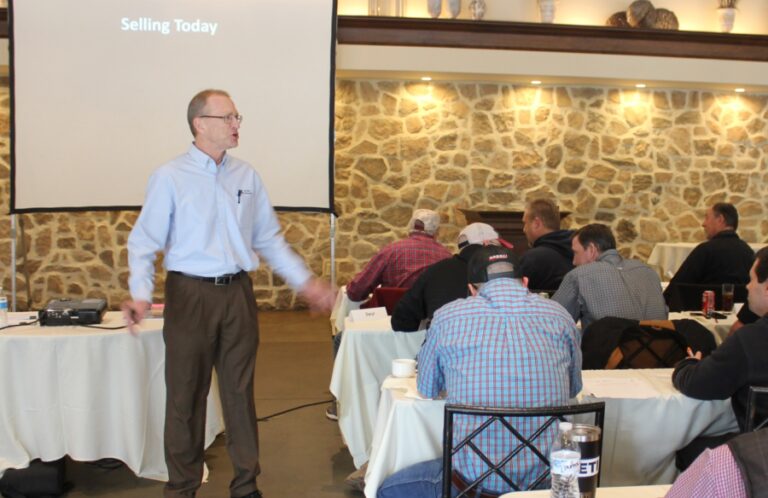and learning when to choose the correct one
Working around sales organizations every day as a sales trainer and coach gives me a chance to compare and contrast great salespeople versus their peers. While there are dozens of key factors in achieving high results, these three skills seem to always come through on high-performing salespeople, teams, and their leaders.
The best salespeople I have worked with are aware that the decision to jump from one “P” to the next is more of an art form than an exact skill. However, they do have an internal switch that allows them to make that call and go with it.
Here are the three “P’s” and how you might use them to your advantage.
Pass:
Ever heard the reply, “Hard Pass on that” on TV or maybe from your teenager when asking them to hang out with you? I certainly have many times over.
The best salespeople know their products, their company, their competition, and the strengths/weakness of all of them together. They go where they are strongest and avoid all other areas as much as possible.
When Warren Buffet and Bill Gates were asked how they manage their time with such large organizations, they both mentioned their ability to say “No” as their greatest resource. Opportunities abound for them and tug at their busy schedules. Warren explains that you need the skill-knowledge to know when to say yes and when to say no to make the best use of your most precious resource – time.
Here are a few concepts to get you thinking about this topic in your sales or sales leader life:
- Customer segmentation – who is our target customer?
- High-performing customers vs low-performing customers. If you are a sales leader, then swap out the word “customer” for the word “salesperson” in that sentence.
- Selling to everyone and anyone in any location, every product line…being everything to everyone.
- Chasing pop-up market trends that don’t have sustainable life cycles.
Persist:
At the beginning of the movie, “The Founder” actor Michael Keaton is playing Ray Kroc, the founder of the Mcdonald’s franchise empire. In one word, he tells us what it took: Persistence. And he persisted. I don’t want to spoil the movie for you, but I highly recommend it as one of the great sales and business-building movies to watch.
We have all seen stories of athletes persisting to win gold, everyday people persisting through tragedy to gain their life back, or business owners who faced all odds to be financial success stories. The struggle for us down here in the trenches selling is…when faced with adversity and challenges, when do we accept the defeat and when do we persist through it. Very few great accomplishments ever occur without tough times. Great athletes and great salespeople give up a lot to reach the pinnacle. They persist when almost everyone else quit and went home. Good enough was never good enough for them.
Here are a few thoughts for you to persist in tough times when selling:
- Rejection is a normal and everyday part of selling. Nobody gets 100% when selling.
- Learn from your losses and continuously improve.
- Learning how to “dip your toe in the water” will save you a lot of tough times. If you are the type that would sell all your belongings and live in an RV, then you won’t like this advice. However, the concept of first trying something out on a small scale will help you from running into those big moments when you have to either persist or punt. This brings us to the third “P” for today.
Punt:
It’s the toughest skill for most!
Punting in football is of course when we admit that our offense didn’t get the job done and we need to turn it over to the other team. To our offense, it certainly feels like a failure. But to the head coach, it’s the best choice for the team to win the game.
In selling and business, we are both of those people in one (offense and coach). Punting in sales means we have to admit we failed. We have to admit that we no longer want to persist. We are simply going to count up our losses and move on to a better way to spend our time and efforts.
This can be extremely difficult depending on our DISC style, our current position, and how much we have invested in chasing this opportunity.
The “D” and “C” profiles in DISC do not like being wrong. They feel they have analyzed their market opportunities, made the best choice, and can control their destiny. If you are in those quadrants, be careful how rigid you become in your view of moving on from difficulty or loss.
It’s tough to punt after we have invested so much time and money into an effort. In grain trading, there is a concept of making decisions based on your position. So, if you have a 100,000-bushel bin full of grain, then you are bullish. You haven’t sold it yet and feel like prices have to go up. As markets fall and you realize you could have sold it for a higher price, it becomes tough to admit we were wrong and have to settle for less. This feeling can also be true for your time investment. If you have worked with a customer or a product for the last two years, spending a lot of time with little success to show for it, then it is difficult to make the decision to abandon those efforts.
Here are some thoughts on it:
- Occasionally walk through your warehouse and see which products have dust on them. Think about killing those products and saving your warehouse crew from driving around them.
- Occasionally (at least yearly) review sales reports for products and product lines to phase out. Think about the resources it would free up if you did. This does not mean that all slow-moving or lower-margin products are bad and need to be removed.
- Do this same analysis on market segments and customers. Being able to serve all markets with all products is the ideal customer service dream. However, we are all limited by warehouse space, trucking capacity, manufacturing capabilities, and the two biggest resources: time and money. We might have two customers with fainting show goats but do we really need to have a specific product for them and dedicate warehouse space to them? At a sales meeting once, we once gave a standing ovation to a salesperson who balanced a custom feed diet for a seven-cow dairy. Sitting back down, the salesperson next to me leaned over and said, “Why? We should be reprimanding him for wasting his time.” Maybe reprimanding is not the right answer, but it makes you think about where you are spending your time.
Take some time today and look at your calendar over the next 30-60 days. Look at the products you are planning to promote. Look at the market segments you are chasing. Where can you Pass, Persist, or dare I ask, Punt to make your efforts more successful?
As an added bonus for listening to the podcast, I added a fourth “P” that I see in highly successful salespeople and sales leaders. The podcast can be heard by clicking the link at the top right on this page or on Apple, Spotify, etc.


